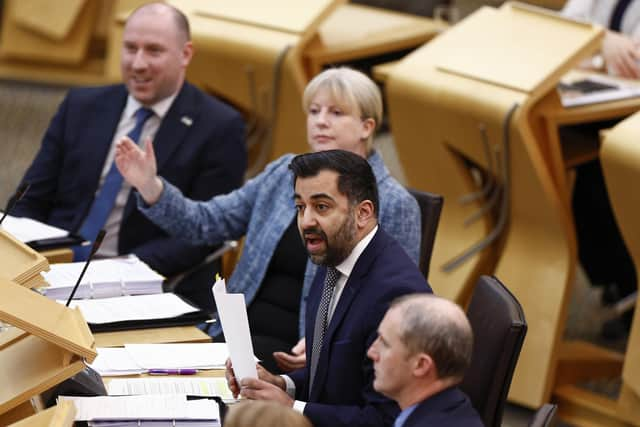‘Fantasy’ to say Spain’s independence stance shaped Covid policy, says Humza Yousaf
Humza Yousaf has denied Scotland chose to lift travel restrictions on Spain during the pandemic because of the potential impact on independence.
The First Minister said the claim, which emerged from documents submitted to the UK Covid Inquiry, was “absolute fantasy”. He said decisions were taken for “purely epidemiological reasons”.
Advertisement
Hide AdAdvertisement
Hide AdThe inquiry was previously shown an email sent on July 19, 2020, that raised concerns about Spain remaining on the list of countries subject to quarantine rules.


Scott Wightman, the Scottish Government’s director for external affairs, told senior ministers, including Nicola Sturgeon and Mr Yousaf, he was “extremely concerned about this”.
He wrote: “It won’t matter how much ministers might justify it on health grounds, the Spanish Government will conclude it is entirely political; they won’t forget; there is a real possibility they will never approve EU membership for an independent Scotland as a result.”
The following day, July 20, Mr Yousaf, who was then the justice secretary, announced quarantine rules had been lifted for Spain. At the time, the Scottish Government said this followed a thorough review of infection prevalence rates.
Scottish Conservative leader Douglas Ross raised the email during First Minister’s Questions in Holyrood on Thursday, asking why independence was "even considered" in a decision about public health.


Mr Yousaf said it wasn’t, adding: "To suggest the decision around Spain was made for any other reason than epidemiology, I'm afraid, is an absolute fantasy." He said Spain was not included on an earlier list of countries exempt from quarantine rules, unlike in England and Wales.
"Scotland did not include Spain on the exempt list like England and Wales did,” he said. “Why? Because their point of prevalence at that time was 0.33 – that was four times higher than the point of prevalence in Scotland.”
Mr Yousaf added: “So Douglas Ross can do his best to spin, he can do his best to throw insults, he can do his best to try to malign and misrepresent facts, and malign not just ministers, but civil servants. But I believe the people of Scotland know – for all of the challenges that we had during the pandemic – that the Scottish Government always, always prioritised protecting the public from the harms of Covid.”
Advertisement
Hide AdAdvertisement
Hide AdMr Ross called this answer “bizarre”. He said: "The day after Humza Yousaf received that email speaking about political concerns that there might be with a Spanish government allowing an independent Scotland into the EU, he stood up and announced that they were introducing a travel corridor with Spain. The very next day, they opened up travel to Spain and five days later they had to close it down again because Covid cases were rocketing. That’s a fact.”
The Scottish Tory leader added: “It’s black and white in evidence to the inquiry that they were thinking about independence instead of focusing purely on public health.”
Mr Yousaf said Spain was put on a “travel corridor” because data provided by the London School of Hygiene and Tropical Medicine showed “a marked improvement” in its position.
He said: "That is the reason, of course, why they were then put on the exempt list. When the situation worsened, just a matter of days later actually, worsened considerably, all of the UK nations decided to take them off that exempt list..”
Comments
Want to join the conversation? Please or to comment on this article.
